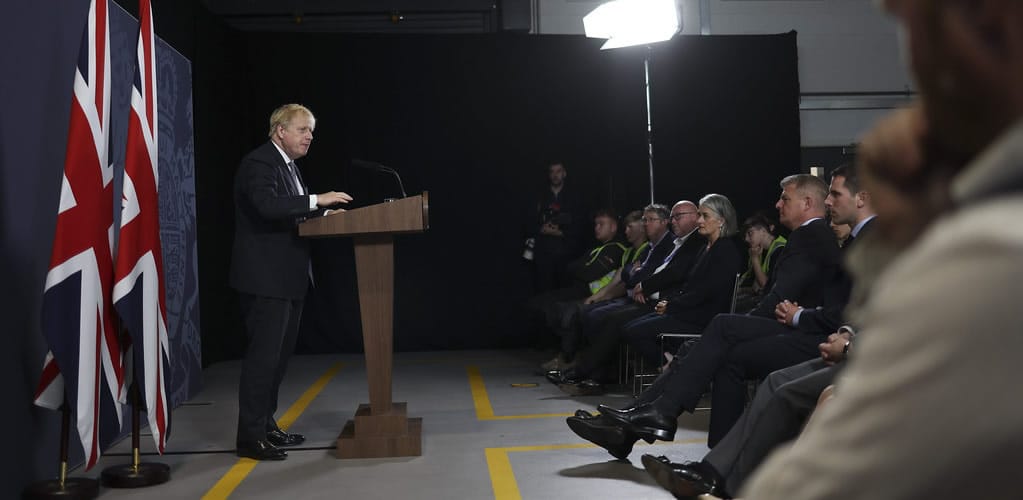Behind the scenes of Westminster – How government whips are losing their influence.
Boris Johnson has burned so many commitments and bridges that it seems more than likely that the Tory whips will be unable to salvage them beyond 2022 even when using intimidation tactics to keep him in power.

Boris Johnson has burned so many commitments and bridges that it seems more than likely that the Tory whips will be unable to salvage them beyond 2022 even when using intimidation tactics to keep him in power.
First published: June 2022.
The recent confidence vote against Boris Johnson dealt a blow to the prime minister’s leadership, revealing the level of opposition he faces within his own party. For those of us who research parliament, situations like this one are an interesting peek at what goes on behind the scenes in party politics.
MPs have to pay attention to what they are told by constituents, local parties, advisers and public polls – but most of all, the whips. Parliamentary whips are MPs appointed by each party leader to encourage loyalty to their common cause. Government whips try to make sure that the government passes its business – mostly laws – and that the prime minister gets loyalty.
In the case of a confidence vote in the leader (a Tory tradition), the whips use a mix of incentives (such as promotion) and threats to dissuade MPs from submitting letters to the backbench chair calling for a vote. If that fails, they try to persuade them not to vote against the prime minister.
The opposition whips engage in similar strategies, but to scrutinise and undermine the government and its goals. Led by the chief whip, the whips act to create solidarity and obedience among the larger team of the political party.
In the past, they communicated by sending instructions on paper, then by pager, and now messages are sent by email or on WhatsApp. It is not so different from the communications team in any organisation. But in parliament, the heat is turned up by exposure to the media and public.
Without free, impartial, and fact-based media, information and democracy will always be controlled by governments and those who control the media. Support PMP Today!
CHIP IN or DONATE REGULARLYShifting loyalties
Over the past 50 years, government whips have increasingly struggled to keep their members on side, as political scientist Phil Cowley has found. On the one hand, the government has around 160 to 170 MPs on the payroll (as ministers, whips, parliamentary private secretaries, party vice-chairs and trade envoys) who have to vote with the whip to keep their jobs. On the other hand, MPs have become more rebellious each parliamentary session since the 1950s.
Whipping has changed dramatically, as I explain in my anthropology of MPs at work. Whips used to intimidate new backbenchers with threats and occasionally violence – vote as you are told or you won’t be promoted to minister, get a place on a select committee or be allowed a “slip” (absence from a vote). Persistent offenders might by threatened with the withdrawal of the party whip (indicating their party membership), support at the next election or the release of damaging information about them to the media.
But the power of political parties, and both whips and leaders within them, has been weakened in recent years, making backbench support far less reliable. Parliament has absorbed a general cultural decline in deference, diminishing the automatic respect for party leaders.
Leaders are more distant from their backbenchers because they no longer network and gossip with them in the tea rooms, bars and corridors. Relying on a terrific performance when speaking to the whole party in order to drum up support – at the Tory 1922 Committee meetings for example – has become riskier without that everyday relationship building.
Meanwhile, MPs spend far more time in their constituencies as seats are perceived to be less safe at elections and to respond to demands for help from their constituents. So they are increasingly influenced by constituents and local party members.
As loyalty to leaders becomes more fragile, MPs find their leaders disappointing with ever greater speed. Politicians making poor judgements, or committing misdemeanours, are far more easily exposed. Leaders or whips using intimidation can find their words repeated on Twitter within minutes, accompanied by indignant commentary from those they’ve threatened.
Some prospered during the pandemic & claimed hundreds of millions of pounds from the government’s furlough scheme. PMP received nothing. Help us as we crowdfund to make sure we continue our work.
Please CHIP IN to keep us going!Cracking the whip
The punishment for MPs who rebel fluctuates in severity depending on the culture of the party, the approach of the leader and the size of the government’s majority. During the Blair/Brown governments of 1997-2010, their huge majorities rendered reprimands unnecessary.
Jeremy Corbyn, the second most rebellious MP during this period, explained to me in an interview that his whip became quite relaxed. He described how a typical phone call with his then whip Sadiq Khan (now London mayor) would go:
Jeremy: I’m going to vote against.
Sadiq: OK.
Jeremy: I mean against the government.
Sadiq: Yes, I know.
Jeremy: Sadiq, at this point you are supposed to persuade me to support the party.
Sadiq: I can’t be bothered. Would you consider abstaining?
Jeremy: No, sorry I can’t do that.
Sadiq: OK.
Losing trust
Whipping has gradually involved more intelligence-gathering and persuasion than disciplining – especially during the time I was researching MPs (2010-2015). However, this pattern abruptly changed again with the aftermath of the Brexit referendum.
As prime minister, Johnson showed his desperation toward 21 anti-Brexit Tory rebels by removing the whip in September 2019. Many lost their seats in the general election a few months later.
In general, people support each other in politics when they like, trust and have confidence in each other; they follow leaders when they feel recognised and represented by them. So agreement on ideology and values is not the only driver of loyalty. If social bonds become fragile, then parties can no longer rely on loyal voting either outside or inside parliament, and may even find that their supposed supporters turn against them.
The more the Conservative whips use intimidation tactics to keep Johnson in power, the more enduring loyalty is likely to dissipate. He has burned so many commitments and bridges, it seems more than likely that the whips will be unable to salvage them beyond 2022.

GOING FURTHER:
- What makes a Tory MP rebel – and what are their red lines on Brexit? | LSE
- The House of Commons – An Anthropology of MPs at Work | Routledge
— AUTHOR —
▫ Professor Emma Crewe, Professor of Social Anthropology, SOAS, University of London.
► twitter
Sources
- Text: This piece was originally published in The Conversation and re-published in PMP Magazine on 13 June 2022. | The author writes in a personal capacity.
- Cover: Flickr/Number 10. - PM Boris Johnson. | 9 June 2022. (Licensed under a Creative Commons Attribution-ShareAlike 4.0 International License.)






[Read our Comments Guidelines]